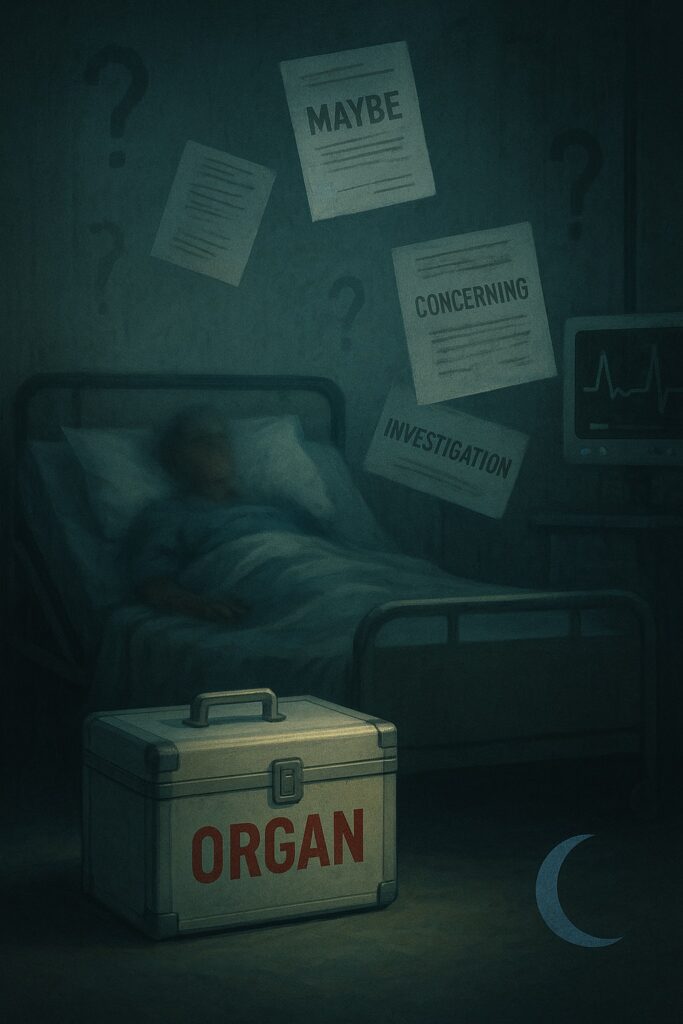The quiet dismantling of medical trust, one bullet point at a time
Darker Side of the Spectrum: Volume VI
Key Takeaways:
- HHS press release leverages ambiguous, inflammatory language to suggest wrongdoing in organ procurement, without providing clinical proof.
- Phrases like “may not have been deceased” and “concerning features” are used strategically to create doubt, despite a lack of verified harm.
- The absence of a named HRSA Administrator enables top-down ideological narrative control.
- This tactic reflects a broader pattern: substituting suspicion for science in public health governance.
- Documenting this manipulation is critical—not just to preserve trust in medical ethics, but to expose the mechanisms of authoritarian influence disguised as reform.

It reads like a warning from a dystopian novel: “Patients may not have been deceased at the time organ procurement was initiated.”
But this isn’t speculative fiction. It’s a July 21, 2025 press release from the U.S. Department of Health and Human Services (HHS) under Secretary Robert F. Kennedy Jr., citing an investigation by the Health Resources and Services Administration (HRSA) into a major organ procurement organization (OPO) in Kentucky. The language is chilling, but the facts? Far less certain. And that may be the point.
This episode marks a new chapter in RFK Jr.‘s campaign to consolidate control over the nation’s health infrastructure. It offers a masterclass in how ambiguity, insinuation, and the absence of expert oversight can be wielded to erode public trust in medicine.
The Anatomy of a Rhetorical Assault
The press release states that HRSA “examined 351 cases where organ donation was authorized, but ultimately not completed.”
That line alone invites suspicion. But what does it actually mean?
Organ donation often involves authorizations that don’t result in procurement due to medical complications, changing circumstances, or family decisions. This is not abnormal. But the Kennedy HHS frames these incomplete donations as failures—or worse, ethical violations.
“103 cases (29.3%) showed concerning features…”
What are “concerning features”? It’s a rhetorical fog. No clinical definition. No legal standard. No peer-reviewed context. Just the implication that something dark and wrong occurred.
“At least 28 patients may not have been deceased…”
This is the centerpiece of the release—and the most egregious misuse of language. The phrase “may not have been deceased” is deliberately constructed to sound like fact, while admitting it is not. There’s no autopsy data. No documented cases of organs being taken from living patients. No cited medical error. Just speculation, amplified by the phrase “raising serious ethical and legal questions.”
What we are witnessing is not a presentation of new facts—it is a masterful use of insinuation as evidence.
What They Don’t Tell You
Nowhere in the release is there a denominator. 351 cases out of how many total reviewed? 5,000? 30,000? How many of these involved high-risk, last-resort cases in rural hospitals where documentation might be imperfect but care was earnest?
And perhaps most damning: the release notes that these were cases where donation was authorized but not completed. If organs weren’t taken, and patients survived, then the process—however imperfect—worked. It halted when needed. That’s not evidence of abuse. That’s evidence of a system trying to err on the side of caution.
The Silence of Expertise
Compounding the concern is this: HRSA currently has no publicly named Administrator.
That absence is not an accident. It allows RFK Jr. to position himself as the moral center of the agency’s investigations, free from interference by seasoned public health experts who might object to the weaponization of uncertainty.
Without a leader with credibility and clinical experience to interpret findings, Kennedy is free to shape the narrative. In this case, he’s done so by invoking anti-establishment language about “sanctity of life” and “reckless disregard,” echoing conspiratorial fears about organ harvesting that long predate this administration.
Field Notes on the Real Threat
We should name the harm clearly: this is not just about one OPO. It’s a broader strategy to dismantle public confidence in the ethics of modern medicine. By choosing an emotionally charged issue like organ donation—one that rests on societal trust in death determinations, medical consent, and brain death protocols—Kennedy strikes at the heart of bioethics itself.
It is not reform. It is fearmongering.
And if we don’t push back now, the damage won’t be limited to transplant networks. It will ripple into ICU care, hospice, and how we treat all neurologically complex or critically ill patients.
This is not about fixing a broken system. It’s about breaking trust.
Let us be clear:
- “May not have been deceased” is not a medical finding.
- “Concerning features” is not a diagnosis.
- “Authorized but not completed” is not evidence of harm.
This is not transparency. It’s propaganda. And the longer we allow this administration to substitute suspicion for science, the more vulnerable we all become—especially those already navigating the margins of life and death.
Filed under: The Darker Side of the Spectrum – Volume VI
Further Reading:
